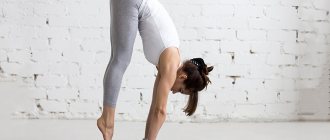Muscle recovery
After physical exercise, biochemical reactions occur in muscle cells that attract additional water - hence the weight gain. The muscles recover in this way, and this is normal. The process usually takes from one to three days - these figures depend on the characteristics of the body, muscle group and the magnitude of the load. This is also influenced by how intensely a person trains and for how long.
Egor Fukalov
Fitness trainer
Experienced athletes usually do not experience swelling after training, but for beginners this outcome is quite likely. Swelling, for example, can be accompanied by strength exercises, because during such exercise microtraumas of the muscles occur, and this is stress for the body. There is no need to be afraid; as you adapt, this process will normalize.
Who is more likely to gain weight during exercise?
Because of training, hypersthenics tend to “get fat” first of all. “They have a slower metabolism, so it’s harder for people of this body type to lose extra pounds, and, accordingly, it’s easier to gain them,” says Leonid Zasedatelev.
“Normostenics, of course, are in the most advantageous position: it is easy for them to gain or lose weight. But weight “sticks” to asthenics with difficulty. If they have this task, they will have to change their diet towards increasing the volume and quality of food,” adds Maxim Oborin.
How much weight can you gain after training? There is no exact answer to this question. “It depends on the type of nutrition and metabolism of each individual person. Some will gain 3-4 kg, while others will lose 5 kg. Often, at the beginning of classes, a beginner’s lymphatic drainage improves, which contributes to the loss of excess fluid. But the muscles will still become denser during training,” says Maxim Oborin.
Dehydration
In the early days after training, you can lose a huge amount of water. If a person weighs, for example, 80-90 kilograms, when he runs 10 kilometers, he will sweat a lot and lose one kilogram along with water.
If you do not “replenish” your water reserves in time, this will lead to an imbalance in the water-salt balance in the body. In this case, the level of antidiuretic hormone, which is responsible for water balance, will increase, and this can contribute to weight gain. Of course, after one workout the weight will not increase significantly, but after several sessions this can happen.
Are you eating little and drinking a lot of water, but not losing weight? Why the scheme doesn't work
This can also manifest itself in the form of swelling, which can make you look fuller. The human body on average consists of 50-60% water - it can change body weight by a couple of kilograms. This is where weight fluctuations occur throughout the day.
This is partly why diuretics (diuretics) are so popular - they “drain” excess fluid from the body and give a short-term weight loss effect. But these drugs are intended to treat various diseases, and not to combat excess weight. If you drink enough fluid, the level of antidiuretic hormone and water-salt balance will be normal.
Photo: unsplash.com/@e_sykes
Should you be afraid of “gain” due to training?
No, even if you originally came to fitness to lose weight. “If you intend to lose weight, but the weight does not change at first, this is because the muscles have become denser. This is not a reason to despair or avoid strength training. Growing muscles will help you lose weight even at rest. Your basal metabolism will increase and you will burn more energy (and excess fat) even while you sleep,” adds Maxim Oborin.
Therefore, gaining weight after training is not yet a reason to give up these very workouts.
Want to do fitness online? Try the lessons from the video library “LIVE!”
Changes in body weight
Many people hope to leave the gym weighing at least half a ton less. But this will not happen immediately after training; rather, on the contrary, the numbers on the scales will creep up.
Body weight is the sum of the weight of not only adipose tissue and muscles, but also bones, fluid, and internal organs. Immediately after training, some of these indicators may change - the muscles are restored, fluid accumulates in the tissues, and no one has yet canceled diuresis. For example, if a person drinks plenty of water during and after training, then weight may increase. But as soon as he sweats or visits the restroom, his weight returns to normal.
Photo: unsplash.com/@victorfreitas
How can you tell if your weight gain after training is due to muscle and not fat?
Simple weighing will not help here. “The best way is to measure body composition using special equipment. For example, using the bioimpedance method, which is done in many fitness centers. There is also a caliperometry method, which also allows you to calculate the muscle and fat content in the human body,” advises Maxim Oborin.
Subjective self-examination will also help. If you notice that you have become more muscular and the folds of your skin are thinner, it means that the weight gain is due to muscle tissue (not fat). But experts consider this method the least accurate.
Calorie surplus
Let's be honest, some people train just so they can have a blast at McDuck or FSC. After a workout, many people reward themselves, with a clear conscience they go to compensate for the calories burned and abuse “healthy” snacks.
5 exercises for every day to keep your muscles toned
What complicates the situation is that after intense exercise, severe hunger sometimes appears, which few can resist. All this can lead to weight either staying the same or growing.
Egor Fukalov
Fitness trainer
After physical activity, an increased appetite actually appears. After all, a person spends a lot of energy, and protein synthesis increases in the body in order to restore those tissues that were destroyed during the training process.
Possible causes of weight gain
Probably 90% of women regard weight gain as a serious problem.
But when working out in the gym, there are situations when this growth is not only desirable, but necessary, even if you are working to lose weight and strive to lose weight.
Muscle growth
When new women first come to the gym, their muscles are not toned. On the other hand, they absorb the impact of force load like a sponge absorbs water.
Even minimal weights and basic strength exercises cause a positive reaction in the body of a beginner.
In a short period of time (2-4 weeks), many indicators of the level of training increase :
- Improves muscle tone
- Increases strength, endurance and flexibility
- Muscle hypertrophy occurs
- Increases intermuscular and intramuscular coordination
All of these are natural physiological processes that are activated in the body in response to power load.
In this regard, in the first weeks of training, an increase in body weight of 1-2 kg is observed. If such girls train to lose weight, then, as a rule, at the same time some parts of the body become smaller. The waist, pelvis and hips are the first to lose weight.
The reason that the weight has increased and the volume has decreased is simple - when the muscles become toned, they give a small increase in kilograms. But at the same time, you follow a diet and do cardio regularly. That is, favorable conditions are created for fat burning.
Weight increases due to increased muscle tone, and volumes decrease due to decreased levels of fat and excess fluid in the body.
By the way, this situation usually occurs for girls only in the first month of training in the gym. In the future, a proper diet with a calorie deficit helps to reduce both body weight and volume. In such conditions, muscles practically do not grow, and fat continues to be burned.
Therefore, if your body weight has increased at the initial stage, do not worry. This is a normal process. Continue to exercise and stick to your diet, and after 4-6 weeks the numbers on the scale will begin to steadily decline.
Increase in body fat
The second common reason is an increase in the percentage of subcutaneous fat due to basic dietary errors.
Those who want to lose weight should remember one feature of strength training. They speed up metabolism, which increases appetite.
Daily energy consumption due to training becomes much greater, so the body strives to restore the reserves of burned calories.
If you do not control the amount of food you eat per day, as beginners mistakenly do, then instead of losing weight, you will gain weight both by increasing muscle tone and by accumulating new fat.
The main condition for losing weight is to spend more calories than you eat in food! This creates a deficit that will be compensated by burning fat.
If you are working for weight, on the contrary, you need to eat more, but no one has canceled the control of the ratio of proteins, fats and carbohydrates. But this is a topic for another article.
Fluid retention
Another reason is fluid retention in the body.
This factor can be easily determined by one sign: when water accumulates, a sharp increase in body weight occurs. For example, plus 1-1.5 kg per night.
Fat doesn't grow at that rate!
It is necessary to find the factor that provoked this situation in order to avoid making mistakes in the future.
The most common causes of fluid retention in girls:
- Lots of salty foods, especially at night
This also includes very spicy dishes in the evening. These products impair water excretion, so don’t be surprised by general swelling in the morning.
- Excess carbohydrates in the diet, especially simple sugars
One gram of carbohydrates “binds” up to three grams of water, accumulating it in the body.
By the way, this is one of the main reasons for sudden weight loss when girls go on a diet low in carbohydrates or completely absent.
In 1-2 days, all the water that carbohydrates “held” goes away and 2-3 kg are gone. But the problem is that it is not fat that is lost, but liquid, which returns just as quickly.
- Menstrual cycle
Depending on individual characteristics, some people begin to retain fluid 7-10 days before the start of menstruation, and for others even after their end. This point must be taken into account when losing weight.
- Muscle swelling after exercise, resulting in weight gain
Swelling occurs either due to injury, when there is a strong accumulation of fluid in the injured area, or due to severe soreness (this is also a kind of microtrauma of muscle tissue).
The influence of female hormones
In the female body, the synthesis of sex hormones estrogen and progesterone predominates. One of their main functions is the accumulation of fat and its maintenance at the required level. This is necessary for the correct functioning of the reproductive function.
Therefore, it is more difficult for women to lose weight than for men. Nevertheless, they successfully lose excess body weight, it just takes a little more time and effort.
However, there are situations when no strict diet or exercise helps. In this case, the reason often lies in hormonal imbalance.
A consultation with an endocrinologist who will help return the indicators to normal is necessary. After treatment, you can return to exercise in the gym.
Abuse of proteins and carbohydrates
Many beginners believe that they need a lot of protein. It is clear that protein is an important part of the sports diet, but it should not be abused. In addition to putting stress on your kidneys, too much protein can also affect your weight.
Photo: unsplash.com/@victorfreitas
As for carbohydrates, only professional athletes need them in large quantities before a race, for example. So if your run lasts less than two hours, you don't need excess carbohydrates.
In general, ask any expert and they will tell you that weight is not the main indicator of success. Focus not on numbers, but on changes in body quality. Buy scales with a body composition analyzer - they show the percentage of fat and muscle, bone tissue, water, and visceral fat content. Some models even determine what caused the weight change: muscle, fat or water. Don't obsess over your weight and look in the mirror more often - this will give a more accurate picture of your appearance.
Before training
Before training, it is recommended to eat food rich in carbohydrates
.
In the understanding of the average person, carbohydrate food is something sweet. But foods containing too much sugar are a way of providing the body with energy, which ultimately lasts only for a very short time. A lot of glucose enters the blood, a large amount of insulin is released in response, and thanks to this, glucose is utilized almost immediately. Of course, at this moment a person feels a surge of strength and an improvement in mood. But by the time the workout begins, the energy boost ends and the strength disappears. And training a hungry person is not only ineffective, but also threatens health problems. Therefore, says Korochkin, before training it is better to eat complex or, as they are also called, slow carbohydrates that will be absorbed gradually: vegetables, whole grain products and cereals. Polished rice, pasta and white bread are not suitable for a pre-workout snack - these foods contain too much starch. And it is just as useless for providing the body with long-term energy as sweets. Be sure to drink enough fluids
before and during your workout . It improves thermoregulation and maintains metabolism at an optimal level. The ideal option is clean water. All sweetened drinks do not quench your thirst and, moreover, add extra calories.
Why is it believed that aerobic exercise reduces the effectiveness of strength training?
In 1980, Robert Hickson, an employee of the University of Illinois (Chicago, USA), published a paper in which he showed that after strength training combined with aerobic exercise, muscle strength increases more slowly than as a result of strength training alone. Strength training in this study was done three times a week, and aerobic training was done six times a week, and when training sessions were on the same day, there was at least a two-hour break in between.
Thirty-two years later, specialists from the University of Tampa (USA) also described this effect, although there were other studies that did not find a negative effect of aerobic training on increasing muscle strength.
According to some data, aerobic training carried out simultaneously with strength training negatively affects other indicators, including explosive or rapid strength (the ability to develop maximum force in the shortest time), muscle power and muscle size. It turns out that combining strength training with aerobic exercise is ineffective.
Over time, even special terminology for labeling appeared. The combination of strength and aerobic programs was called "competitive training", and the negative effect of aerobic exercise on the adaptations usually resulting from strength training was called the "interference effect".
But why does this effect occur?











